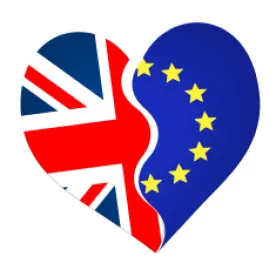Few in Brussels expected Leave to win. The shock was palpable and first reactions very emotional: from EU officials literally crying in Council meetings to leaders suspecting the Brits of having invented a trick to Remain, while pretending to Leave. The absence of any plan from the Leave camp and the immediate damage caused to the British economy reinforced the feeling that something almost entirely negative had happened – for the UK as well as for the rest of the EU.
The first reaction was therefore very confused. However, after a week of bilateral meetings, a European Council, and a meeting on 29 June of the 27 heads of government without their British colleague, a rather clearer EU reaction has evolved.
The Timing of Starting the Article 50 Procedure
Immediately after the result of the referendum, EU decision makers were divided amongst those who were urging the UK to start the separation procedure as swiftly as possible and those who considered it more sensible to wait for the political situation in London to clarify.
Those who wanted the negotiation to start immediately were preoccupied by the incredible complexity of the continuing participation of the UK in EU affairs before and during the 2-year period leading to the completion of the exit treaty. They were furious when Cameron said that it would be for his successor to start the procedure in October. And even less pleased to hear Home Secretary Theresa May, the new favorite to replace him as prime minister, state that she would not do it before the end of the year, not ‘until the British negotiating strategy is agreed and clear’.
Those who advocated patience – including, initially, chancellor Angela Merkel – accepted that the political turmoil in London did not permit a quick decision. It was even hoped by many in Remain-dominated London that Brexit could still be avoided after a general election in the fall, which might have created a new political context.
This having been rejected by the main candidates for the post of UK prime minister, the EU consensus developed a medium term scenario: as the new prime minister would probably be chosen before the regular meeting of the European Council on 20 – 21 October, he or she should use this occasion to formally ‘notify of the UK’s “intention to withdraw from the Union”’, according to the terms of Article 50 of the Treaty on European Union. The Council would then adopt ‘guidelines’ for the negotiation, which would start immediately, with the clock ticking until October 2018.
The reasoning is that it would be odd to have the new prime minister participate in the October European Council without making this move. The 27 leaders indeed insisted in the statement issued after their 29 June meeting, that, before Article 50 is triggered, there will be ‘no negotiation of any kind’.
It is obviously up to the UK government to decide when to trigger Article 50, but the pressure from the EU leaders to follow this scenario will be strong.
Who will Conduct the Negotiation from the EU side?
The Lisbon treaty is rather ambiguous in balancing the role of the Commission and the Council of ministers in a negotiation under Article 50, and the legal services of the two institutions have argued about who would conduct the negotiation. Interestingly, this is not just another bureaucratic quarrel. Some Member States are genuinely afraid that, if the Commission took the lead, it might not focus enough on the political sensitivities of the negotiation. Others simply want to ensure all matters are within reach, for close monitoring.
The discussion about Brexit has been an occasion for some EU leaders to criticize the Commission – and its president Jean Claude Juncker – for imposing policies which should be decided by the Member States. Some heads of government from Eastern Europe even asked Juncker or the entire Commission to resign because of Brexit, as if the Commission was responsible for the failure of the Remain campaign. Their resentment against the Commission originates in the migration crisis of 2015, when Juncker suggested a sharing of migrants among Member States based on objective criteria and enforced by sanctions. This had been very difficult for the Eastern Europeans to swallow – jealous of their sovereignty recovered not so long ago, after the fall of the iron curtain.
In the end, it was decided that the agreement concluded would be with the UK ‘as a third country’, which means that the Commission will conduct the negotiation, according to the procedure for negotiating agreements with third parties. But the discussions on the framework of the new relationship between the EU and the UK will be very much under the responsibility of the Council, which has already created a taskforce intended to make the inventory of all possible options and prepare the EU’s positions. It is probable that the Member States will be represented in the negotiations by the ‘Sherpa’. The European Parliament will also be involved, having to give its consent to the final agreement, according to Article 50 of the Treaty.
The Internal Market versus the Free Movement of People
The conditions under which post-Brexit UK could continue its participation in the internal market were discussed at length, even before the start of the referendum campaign. The EU position has always been that the free movement of people ensured by the treaty is not open to exceptions. In the negotiation on the ‘settlement’ for the UK concluded in February, the only possible option to help the UK deal with growing public discontent on EU immigration was explicit: the setting up of an ‘alert and safeguard mechanism’ when the flow is of ‘an exceptional magnitude over an extended period of time’. This had been agreed in principle.
This ‘settlement’, applicable had Remain won, has now been declared null and void, but EU Member States will not be prepared to go beyond these limited concessions if, on leaving the EU, the UK wants to continue to participate in the internal market. This question was discussed by the 27 in their meeting on June 29, during which some asked that the text of the draft statement be reinforced to make very clear that ‘any agreement (…) will have to be based on a balance of rights and obligations. Access to the Single Market requires acceptance of all four freedoms’.
The Future of the EU of 27
The success of Leave in the referendum was applauded by the populist parties in the EU – some, notably in France and the Netherlands, asking for the same to happen at home. Polls organized last week revealed that the anti-EU feelings were stronger than ever in many Member States, making leaders fearful of a ‘contagion’ of Exits in other countries.
Since the financial crisis, public opinion overall has understandably been much less enthusiastic about European integration, many criticizing the austerity policies imposed by Germany (and managed by the EU Commission), as well as the inability of the EU to cope with the vast influx of illegal migrants in the last years.
It was therefore crucial that the leaders of the Union demonstrate that the separation from the UK did not mean a failure or the beginning of the bloc’s disintegration. There were discussions at various levels: among the six ‘founding members’; between France, Germany and Italy; among the countries member of the ‘Visegrad group’ (Poland, the Czech Republic, Slovakia and Hungary); and in the various Brussels ‘think tanks’.
The result at this stage is just a procedural decision: the 27 heads of state and government will meet in September in Bratislava, capital of the Slovakian rotating presidency, to develop a ‘political reflection to give an impulse to further reforms’ of the Union. This meeting will notably prepare a declaration for the sixtieth anniversary of the Rome treaty, in March 2017.
Ironically, this procedure was inspired by what had been decided after France and the Netherlands rejected the Constitutional treaty by referendum in 2005. At that time, a process had been launched preparing a ‘declaration’ for the fiftieth anniversary of the treaties, in March 2007: it created the political momentum to allow the conclusion of the Lisbon Treaty.
But this time there will be no question of a new treaty. After the Brexit vote, Francois Hollande and other French politicians tried to revive plans for a further integration of the Eurozone, but they were discouraged by Angela Merkel. Both their countries have presidential elections next year, and Germany is careful not to develop great designs which could be divisive internally and among the EU’s members.
The objective will be rather to make efforts to bring the EU closer to its citizens and discourage them from listening to populists. The text of the statement of the 27 notes that ‘…Europeans expect us to do better when it comes to providing security, jobs and growth, as well as hope for a better future. We need to deliver on this, in a way that unites us, not least in the interest of the young’.
The Way Forward
The withdrawal of the UK from the European Union is a dramatic event, one of the most important in the shaky history of the European construction. It is the first time that the process of European integration is moving in reverse. With no precedent, its implications are difficult to assess, and reactions remain careful and guarded.
The Leave negotiation will be extremely difficult from a technical point of view, but the most difficult thing will be to continue working for two years or more with the UK having one foot in and the other out of the Union. In addition, a lot of questions will be raised which do not yet have a clear answer:
- How will the British government behave in the daily activity of the Union during the next two years? (And what will happen with the UK presidency in the second half of 2017?)
- Will it be possible to agree a status with the UK which would keep the UK in the single market while preserving the free movement of people?
- Will there be a push from some Member States to increase the institutional role of the Eurozone and the Schengen area, marginalizing those Member States who used the UK’s non-participation as a pretext for not joining?
- What will be the implications of Brexit for European defense? Will the European Defense Agency be allowed to function more effectively? Or will the UK withdrawal make the EU-NATO relationship more difficult?
The answer to all of these questions will depend very much on the degree of trust established with the new UK government in the months and years to come – as well as on the forces that will play inside of the Union: there are reasons to expect more cohesion between the 27, but it cannot be excluded that centrifugal forces interfere. Leadership in this context will be crucial – but here too, uncertainty prevails, with the elections next year in Germany, France and the Netherlands.





 />i
/>i

